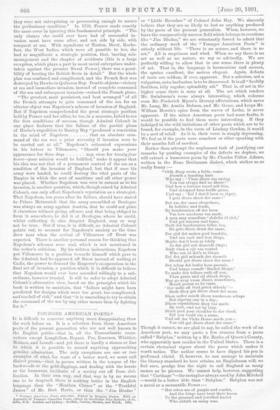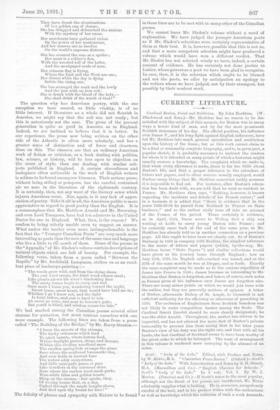YOUNGER AMERICAN POETS.*
IT is difficult to conceive anything more disappointing than the work before us. It is a selection from those Atnerlean poets of the present generation who are not well known to the English public—that is, all the Transatlantic verse- writers except Longfellow, Bryant, Poe, Emerson, Whittier, Holmes, and Lowell—and yet there is hardly a stanza or line to which it is possible to accord anything approaching genuine admiration. The only exceptions are one or two examples of what, for want of a better word, we must call dialect poems,—that is, poems written in the tongue of the backwoods or the gold-diggings, and dealing with the heroic or the humorous incidents of a society out off from civi- lisation. In their own way, and that way is by no means one to he despised, there is nothing better in the English language than the "Heathen Chime" or the "Truthful
James" of Mr. Bret Harte, or than the "Jim Bludso " _
* Younger American Poets, 1830-1890. Edited by Douglas Blimion, With an Appendix of Younger Canadian Poets, edited by Goodridgo Bliss Roberts, of Eit. John, N.I3. London and Sydney; Griffith, Farran, Okodon, and Welsh, 1891,
or "Little Breeches" of Colonel John Hay. We sincerely believe that they are as likely to last as anything produced by the poets of the present generation. When, however, we leave the comparatively narrow field which belongs to creations like"Jim Bludso," we are reluctantly forced to admit that the ordinary work of the "Younger American Poets" is utterly without life. "There is no nature, and there is no art." All is emptiness and wind. When we say there is no art as well as no nature, we say so advisedly. We are perfectly willing to allow that in one sense there is plenty of art. That is, the language is harmonious and correct, the syntax excellent, the metres elegant. Again, defects of taste are seldom, if ever, apparent. Not a solecism, not a. vulgarism, not a barbarism is to be discovered. It is all "faultily faultless, icily regular, splendidly nil." That is, of art in the higher sense there is none at all. The art which renders Mr. Swinburne's verse always interesting, which redeems even Mr. Frederick Myers's literary affectations, which saves Mr. Lang, Mr. Austin Dobson, and Mr. Gosse, and keeps Mr. William Morris's epics from the waves of Lethe, is never apparent. If the minor American poets had more faults, it would be possible to find them more interesting. If they indulged in the wild imitations of other poets which are to be found, for example, in the verse of Lindsay Gordon, it would be a sort of relief. As it is, their verse is simply depressing.
We feel as if the poets were somehow or other speaking with their mouths full of sawdust.
Rather than attempt the unpleasant task of justifying our remarks by quoting examples of the defects we deplore, we will extract a humorous poem by Mr. Charles Pollen Adams, written in the Hans Breitmann dialect, which strikes us as really funny
" Oldt Esop wrote a fable, vonce Aboudt a boasting hero
Who say • Vhen dhere vas racing You can alvays find inc dhero 1 Und how a tortoise raced mit him, Und shtopped hees leedle game,
Und say : I don'd been so shpry, I gets dhere shust dor same !'
Dot vas der cases eferyvhere, In bolidics und trade, By bersbiration off der brow Vas how soocksess vas made.
A man may somedime shdrike id rich,' Und get renown und fame, Budt dot bersbiration feller, too, He gets dhere shust der same.
Der girl dot makes goot beeskits, Und can vash und iron clings, Maybe don'd been so lofely As dot girl mit dimondt rings ;
Budt vhen a vife vas ranted
Who vas id dot's to blame Eef dot girl mitoudt der shewels Should get dhere shust der same ?
Dot schap dot leafes hoes peesnis,
Und hangs roundt Bucket Shops,' To make den tollars oudt off von,
Vhen grain und oil shtock drops, May go avay vrom dhere, sotnedimes, Mooch poorer as he came. Der mills off God grind shlowIy '- Budt dhey get dhere shust der same.
Dhen neffer mindt clhose mushroom schaps Dot shpring cup in a day ; Dhose repudalons dhey vas made By vork, und not by blay. Shunt root your shoulder to der vheel, Eef you vould vin a name,
Und eat der Vhite House needs you— You vill get dhere shunt der same."
Though it cannot, we are glad to say, be called the work of an American poet, we may quote a few stanzas from a poem called" Babylon," written by a Mr. Roche, of Queen's County, who apparently now resides in the United States. There is a certain rhetorical vigour about the poem which makes it worth notice. The author seems to have dipped his pen ihi perfumed vitriol. If, however, he can manage to maintain the literary standard he here attains, no Englishman will, we feel sure, grudge him the right to call England as many names as he pleases. We caniaot help, however, suggesting that "Carthage "—the metaphor always used by John Mitchell —would be a better title than "Babylon." Babylon was not
a naval or a mercantile Power :—
"Her robes are of purple and scarlet,
And the kings have bent their knees To the gemmed and jewelled harlot Who sitteth on many seas. They have drunk the abominations Of her golden cup of shame; She has drugged and debauched the nations With the mystery of her name.
Her merchants have gathered riches By the power of her wantonness, And her usurers are as leeches On the world's supreme distress.
She has scoured the seas as a spoiler ; Her mart is a robber's den, With the wrested toil of the toiler, And the mortgaged souls of men. Her crimson flag is flying, Where the East and the West are one; Her drums while the day is dying Salute the rising sun.
She has scourged the weak and the lowly And the just with an iron rod ;
She is drunk with the blood of the holy,— She shall drink of the wrath of God I " The question why has American poetry, with the one exception we have named, so little vitality, is of no little interest, If literature as a whole did not flourish in America, we might say that the soil was not ready ; but this is notoriously not the case. The prose of the present- generation is quite as good in America as in England. Indeed, we are inclined to believe that it is better. In our experience, the prose now being written on the other side of the Atlantic is often more scholarly, and has a greater sense of distinction and of force and clearness, than on this. The chances are that an ordinary American work of fiction or criticism, or a book dealing with politics, law, science, or history, will be less open to objection on the score of style, than one dealing with similar sub- jects published in England. A certain slovenliness and inelegance often noticeable in the work of English writers
is seldom to be found among our kinsmen. Their serious prose, without being stiltecl or pompous, has the careful, restrained air we note in the literature of the eighteenth century. It is certainly, then, not any want of the literary sense which injures American verse. Nor, again, is it any lack of appre- ciation of poetry. Take it all in all, the American public is more appreciative in regard to good poetry than the English. It is a commonplace that Mr. Matthew Arnold and Mr. Browning, and even Lord Tennyson, have had ten admirers in the United States for one in England. What, then, is the reason P We -confess to being utterly unable even to suggest an answer. What makes the matter even more indomprehensible is the fact that the "Younger Canadian Poets" are very much more interesting as poets than the men of the same race and language who live a little to tge south of them. Some of the poems in the "Appendix" of Mr. Sladen's volume contain descriptions of natural objects which are full of beauty. For example, the following verse, taken from a poem called "Between the Rapids," by Mr. Archibald Lampman, strikes us as an excel- lent piece of landscape-painting ;--
" The woods grow wild, and from the rising shore
The cool wind creeps, the faint wood odours steal ; Like ghosts adown the river's blackening floor The misty fumes begin, to creep and reel. Once more I leave you, wandering toward the night. Sweet home, sweet heart, that would have held me in ; Whither I go I know not, and the light Is faint before, and rest is hard to win.
Ah sweet ye were, and near to heaven's gate; But youth is blind, and, wisdom comes too late."
We had marked among the Canadian poems several other stanzas for quotation, but must content ourselves with one more example. The following lines are taken from a poem called "The Building of the Bridge," by Mr. Barry Straton:—
" I know the secrets of thy streams,
The dusky entrances which load To quiet haunts, where herons feed, Where daylight pauses, sloops and dreams. Within this circling woodland mere The swollen spring-tide swamps the grass Save where the scattered hummocks rise, And over fields in harvest bare The waters eddy everywhere, And little mist-puffs pause or pass Like cloudlots in thy mirrored skies. Here whore the sunken weed.mesh parts, Wax-white lilies and golden hearts Sleep on the stream,—fair spirits, they, Of wooing beams that, on a day, Sighed through the maple boughs above, And died upon thy breast for love !"
The felicity of phrase and sympathy with Nature to be found
in these lines are to be met with in many other of the Canadian poems.
We cannot leave Mr. Sladen's volume without a word of explanation. We have judged the younger American poets as if Mr. Sladen's selections were certainly representative of them at their best. It is, however, possible that this is not so, and that a more competent selection might have produced a volume which would have won a different verdict. That Mr. Sladen has not selected wisely we have, indeed, a certain amount of evidence. He has certainly not done justice to Lanier, whose powers as a poet we have been glad to recognise. In case, then, it is the selection which ought to be blamed and not the poets, we offer by anticipation an apology to the writers whom we have judged, not by their strongest, bat possibly by their weakest work.



































 Previous page
Previous page